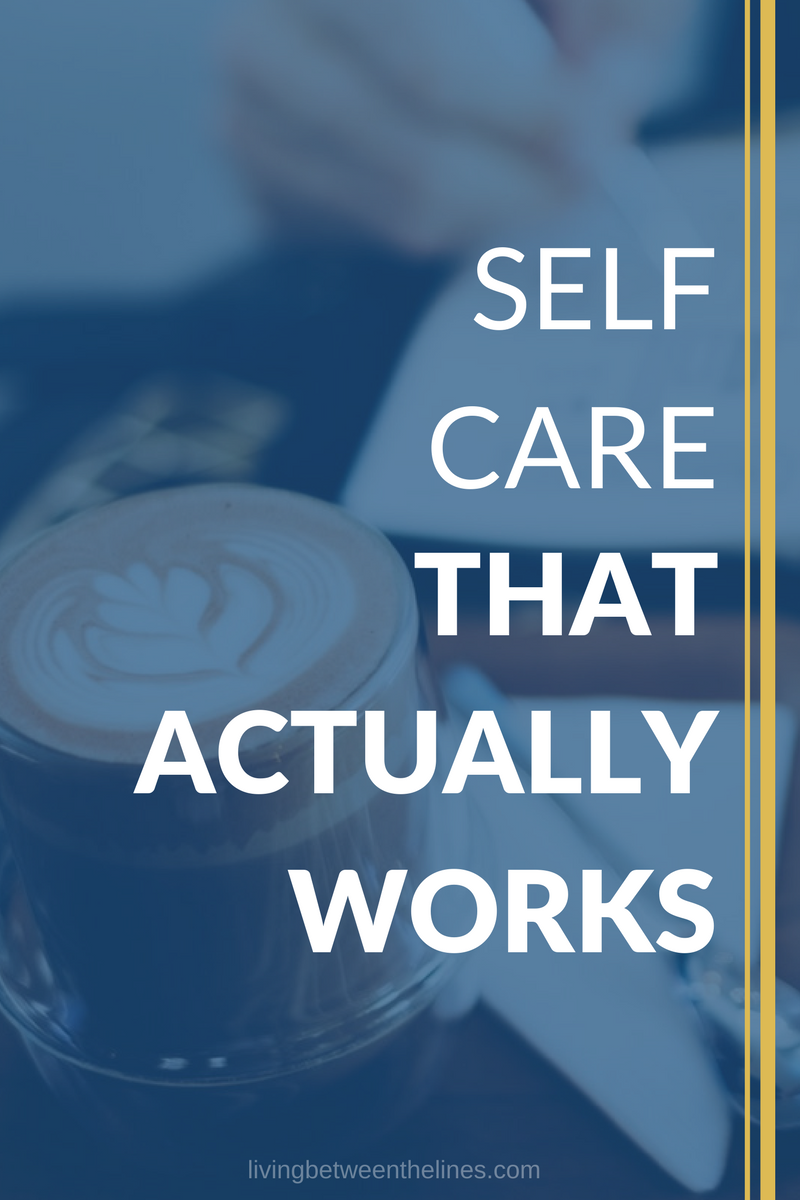So you lit a candle and had a cup of tea, and your stress wasn’t magically cured? Weird. I wonder why. Turns out, the ideas we tend to have about self care aren’t very helpful. I hear a lot of talk about self care, but most if it is really indulgent – tea, candles, maybe an adult coloring book. And while I’m a fan of two of the three (I’ll let you guess which is which!), they don’t seem like enough to actually improve my mental and emotional wellbeing. I’m sure a ton of you have amazing self care plans and strategies, but since I didn’t know much about actually, science-based self care, I think it’s safe to assume that some of you don’t either.
And that’s terrifying, considering we really need self care. It seems like every conversation I have (as a fully-licensed adult) goes something like this:
“How are you?”
“Very tired. Also very busy.”
“Wow, me too! Keep on keeping on!”
“Haha, yeah.”
And that’s it. That’s the whole conversation. It’s a little worrisome, honestly. In college, it always felt like we were competing to see who could do the most on the least sleep. Now, I’m adamant about getting eight hours a night… And I’m still exhausted by the time I get home. And the worst thing is, everyone I know feels the same way.
So yeah, self care absolutely deserves to have a moment. But I’ve noticed that a lot of rhetoric around self care is indulgent. Sure, the ‘treat yo self’ mentality is important every now and then, but it can’t be all you do to take care of yourself! I realized that even my understanding of self care was pretty much limited to ‘light a candle and drink tea.’ (Can you tell I spent my high school years on Tumblr?)
In the spirit of intellectual curiosity, and doing something other than reading Ask Reddit threads for the rest of my life, I decided to do some research on self care’s basics, and how you can use it to actually improve your life.
By the end of this post, you’ll:
- Identify your personal, immediate self-care needs
- Make a self care plan that meets those needs
- Compile a list of resources to help you
I want to add a brief note: This guide is mainly geared at people who aren’t struggling with mental illness. If you’re affected by depression, anxiety, eating disorders, or other mental health concerns, this may help! But please supplement self care with professional medical advice when possible, and be extra cautious to avoid destructive behavior masquerading as ‘self care.’ University of Buffalo has a pretty great Lifestyle Behaviors assessment to help you separate healthy and unhealthy coping strategies. Be well!

Identifying What You Need
Self care should always be based on what you happen to need in the moment. Everyone will have slightly different needs, and yours will probably vary over time. That’s to be expected! As you become more aware of what you need, you may start to notice patterns, which will help you develop self care habits. In the meantime, start with the question “What do I need?” every time you’re feeling run down.
It’s easy to let stress and intermittent anxiety answer these questions for us. It may feel like you need a few extra hours in the day, or an extra $1000 in your bank account, or to lose ten pounds overnight. But focus on actionable, basic goals that you can meet within a short timeframe – try giving yourself a limit like 15 minutes or an hour.
One resource I’ve found helpful for identifying ‘right now’ needs is an interactive flowchart called ‘You Feel Like Shit.’ I think we can all relate to that. YFLS will walk you through assessing your basic needs and environment, so you can identify problems. The latter section also addresses some common mental health concerns!
Based on YFLS, and some extra research, I’ve compiled a basic self inventory you can run through. If you can answer any of these questions with ‘no,’ build a solution into your self care plan.
Self Care Inventory
Today, have you…
- Showered/brushed your teeth/other basic hygiene?
- Gotten enough sleep (usually 6-10 hours)?
- Taken any necessary medications or vitamins?
- Spoken to someone you care about?
- Done at least a little physical activity?
In the past few hours, have you…
- Eaten something?
- Eaten something healthy?
- Had a glass of water?
- Spent at least 15 minutes doing something you enjoy?
Right now, are you…
- Wearing comfortable clothes?
- Warm/cool enough?
- Sitting or lying comfortably?
- Generally relaxed, without any specific issue bothering you?
- Generally comfortable in your environment?
Other strategies
Self care inventories are great and all, but sometimes they feel like a game of twenty questions and you’re feeling too flat and uninspired to deal with them. Here are a few more ways to analyze what you need.
Freewrite – This is a staple of self care, but it can be surprisingly challenging. Be mindful of the expectations you have of your writing, and be intentional about letting them go. You do not need to be grammatical. You do not need to finish every sentence. You do not need to follow all ideas into logical conclusions. I don’t know anyone who can write perfectly freely at all times, but take it in stride and do the best you can.
Talk It Out – Talking to yourself is fine, so long as you don’t actually expect an answer. I work through a lot of problems out loud on my drives to and from work – I’ve found it really helps! So find a room of your own, hop in your car, or take a walk. (If you’re forced to be in public, walk around and plug headphones with a mic into your phone – people will just assume you’re on a call!) Then, just bitch about stuff. Complain freely, and you can identify things that are bothering you.

Weird how sitting in this picturesque windowsill for 20 minutes won’t cure six weeks of work-related anxiety.
Make A Plan
Self care can break down around the planning stage. Sometimes, the articles you read make it sound like all you have to do is indulge in a little online shopping and a bubble bath, and all your troubles will melt away. But then you’re broke and your fingers are all pruney and yet, somehow, you’re still stressed.
Maybe it’s my Type A aspirations speaking, but a good plan is essential to any undertaking. Just remember to keep your self care plans short term, to start. Sure, a workout routine and complete diet change could fall under the umbrella of ‘self care,’ but we’re only human. We need a little instant gratification from time to time, and your self care plans can deliver if you play your cards right.
Focus on what you can do in the here and now to meet the needs you identified earlier. Only add steps to the plan if you can control them, and complete them relatively quickly. This helps mitigate anxiety over the future. It may be wise to give yourself a timeline, and use your phone timer to keep yourself on track.
Break anything you do into manageable chunks. Sure, cleaning your entire house would probably make you feel better… But it would also be exhausting, and might stress you out further. Instead, commit to smaller chunks of action, like clearing the floor in whatever room you happen to be in, and organizing any clutter into more manageable stacks. You’ll feel better about your environment without having to invest too much time or effort.
As always, write your plan down! You’ll think about it more critically about the steps (and their order) if you see them on paper. It’s also a great accountability tool and is proven to help you remember information more easily.
Last, but not least – don’t let the plan stress you out. There are no consequences to doing things out of order, or taking a little more or less time. Just use it as a guide to keep yourself moving forward.

I talk a lot of crap about warm beverages in this post. My apologies to tea, coffee, hot toddies, etc.
Resources
Identifying your needs and making a plan can feel daunting, so I’ve also assembled some resources that might help you out!
Identifying Needs
- ‘You Feel Like Shit’ flowchart
- WWU has a great student self care assessment
- NAMI’s self care inventory is pretty much the gold standard
- Follow Maslow’s hierarchy of needs
Meeting Basic Needs
- This site will help you plan a meal around what you already have
- And here are some inexpensive recipes to try.
- A 10-minute bodyweight workout. Get a little activity in, no equipment required, regardless of how fit you are
If you’re feeling overwhelmed…
- Write the most beautiful, kick-ass to do list, take charge of your life!
- Clear your space and your mind by decluttering
- And here’s a little general ‘not feeling overwhelmed’ advice to think about
Banishing Headaches, Soreness, Etc.
- Identify and relieve your headache
- These stretches are designed for morning, but they’ll feel good any time
- Blogilates is a nice, gentle, guided workout
- Is acupressure a crock? Maybe. Is the placebo effect real? Absolutely. Give it a shot.
If you have more resources, please leave them in the comments! I’ll add them to the main post body on a semi-regular basis.
Take Action!
I’m very, very guilty of reading about things on the internet as a substitute for actually doing them. Maybe all of you are motivated, proactive people who will take all this to heart and apply it later in life, but on the off chance that some of you are like me: here’s your challenge for the day.
Tell me in the comments which of these strategies you’re going to use right now, which one you’ll try later this week, and one you want to turn into a long-term habit. And don’t forget to drop links to any other self-care resources you know about. You never know who you might help!


